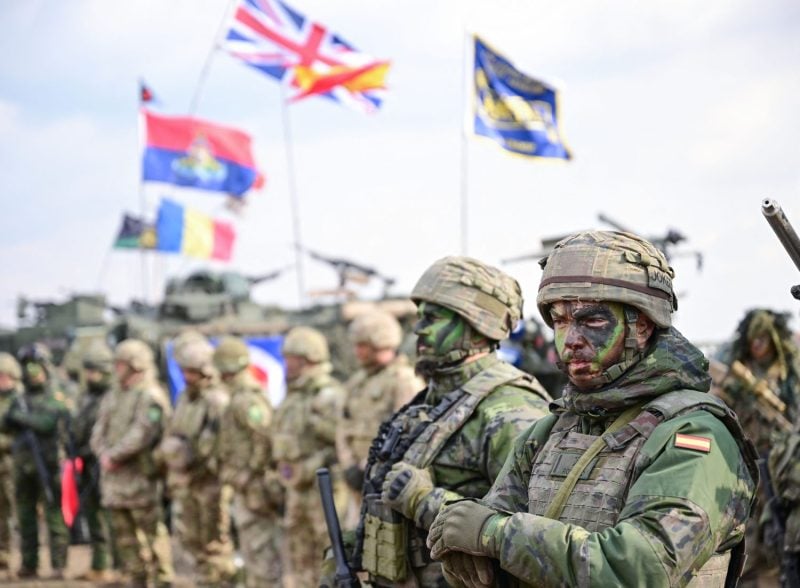Kashmir Reels From Deadliest Attack on Civilians in Decades

Kashmir Reels From Deadliest Attack on Civilians in Decades
New Delhi has accused Islamabad of backing the militant Kashmir Resistance group.
Indian government forces stand guard as ambulances carry the bodies of tourists killed in an attack by gunmen in Srinagar, India-administered Kashmir, on April 23. Yawar Nazir/Getty Images
Welcome back to World Brief, where we’re looking at a deadly militant attack in India-administered Kashmir, negotiations for a Russia-Ukraine peace deal, and Jordan outlawing the Muslim Brotherhood.
Insurgent Attack
Indian authorities launched a massive manhunt on Wednesday to find four individuals suspected of carrying out a deadly shooting in India-administered Kashmir. On Tuesday, the Kashmir Resistance militant group (also known as the Resistance Front) claimed responsibility for killing at least 26 people and injuring 17 others at a tourist destination in the Kashmiri town of Pahalgam.
Welcome back to World Brief, where we’re looking at a deadly militant attack in India-administered Kashmir, negotiations for a Russia-Ukraine peace deal, and Jordan outlawing the Muslim Brotherhood.
Insurgent Attack
Indian authorities launched a massive manhunt on Wednesday to find four individuals suspected of carrying out a deadly shooting in India-administered Kashmir. On Tuesday, the Kashmir Resistance militant group (also known as the Resistance Front) claimed responsibility for killing at least 26 people and injuring 17 others at a tourist destination in the Kashmiri town of Pahalgam.
“Those behind this heinous act will be brought to justice,” Indian Prime Minister Narendra Modi wrote on X on Tuesday. “Our resolve to fight terrorism is unshakable and it will get even stronger.” Modi cut short a two-day trip to Saudi Arabia on Wednesday to return to New Delhi.
The incident was the worst attack on civilians in India since the 2008 Mumbai shootings, when the Pakistan-based Lashkar-e-Taiba militant group orchestrated a series of terrorist attacks that killed 175 people. Local police say the last major assault on civilians in Kashmir—a shooting on a bus carrying Hindu pilgrims in June 2024 that killed nine people—was also carried out by Lashkar-e-Taiba.
The Indian government has not yet officially blamed any group for Tuesday’s attack, but an unnamed Indian security official told the New York Times that the country’s security agencies assess that Lashkar-e-Taiba was responsible and that the Kashmir Resistance is a proxy group for that organization.
And on Wednesday, New Delhi took several punitive steps toward Pakistan, which it accuses of supporting terrorist attacks in India. The measures include suspending participation in a decadeslong bilateral water treaty, closing a key land border between the two countries, downgrading diplomatic ties, expelling Pakistan’s military advisors from the country’s New Delhi mission, and further restricting visas for Pakistani citizens.
Pakistan has rejected the accusations. “We are concerned at the loss of tourists’ lives,” Pakistani Foreign Ministry spokesperson Shafqat Ali Khan said. “We extend our condolences to the near ones of the deceased and wish the injured a speedy recovery.”
Tuesday’s attack was a major setback for Modi’s Hindu nationalist Bharatiya Janata Party, which revoked Kashmir’s semi-autonomous status in 2019 to establish direct control over the majority-Muslim region. In an updated statement on Wednesday, the Kashmir Resistance said the individuals targeted on Tuesday “were not ordinary tourists; instead, they were linked to and affiliated with Indian security agencies.” But local police say all but one of the victims were civilians; an Indian Navy officer who was killed was off duty, as he was on his honeymoon.
Kashmir Resistance added on Wednesday that the shooting should “serve as a wake-up call not only for Delhi but also for those who support Delhi’s questionable strategies,” referring to India’s control of Jammu and Kashmir.
The attack occurred just days after Pakistani army chief Asim Munir described Kashmir as Pakistan’s “jugular vein,” and it coincided with U.S. Vice President J.D. Vance’s high-profile trip to India this week.
“The significance is not lost, and [the attack] is a deliberate act to destabilize India’s Kashmir narrative and signal Pakistan’s continued influence over Kashmir militancy,” former Jammu and Kashmir police chief A.K. Suri told DW News.
Today’s Most Read
- Trump Is Losing Asia by Robert A. Manning
- How the United States Can Regain the World’s Trust by Stephen M. Walt
- Marco Rubio’s Soulless Crusade by Howard W. French
What We’re Following
Unacceptable peace terms. Officials from Ukraine, the United States, and Europe convened in London on Wednesday for Russia-Ukraine peace talks. Despite U.S. Secretary of State Marco Rubio’s last-minute decision not to attend (U.S. special envoy Keith Kellogg was sent instead), attendees tried to downplay Washington’s dwindling involvement, with British Prime Minister Keir Starmer calling the meetings “substantive.”
Wednesday’s talks focused on establishing what Ukrainian President Volodymyr Zelensky would consider as acceptable terms for a truce deal with Russia. Namely, this would be an agreement that does not concede any Russian-occupied Ukrainian land to Moscow—something that the Kremlin wants and the White House appears increasingly likely to allow.
“Ukraine will not legally recognize the occupation of Crimea. There’s nothing to talk about here,” Zelensky said on Tuesday. A U.S. proposal submitted last week included U.S. recognition of Crimea as a Russian territory and no possibility of NATO membership for Kyiv. Zelensky formally rejected this proposal on Wednesday.
U.S. President Donald Trump fired back, saying that Zelensky’s comments would only “prolong the ‘killing field.’” He wrote on Truth Social on Wednesday that “[i]t’s inflammatory statements like Zelenskyy’s that makes it so difficult to settle this War,” adding that the Ukrainian president has “no cards to play.”
Banning the Brothers. Jordan outlawed the Muslim Brotherhood on Wednesday, confiscating the Islamist group’s assets and banning its activities, including any promotion of the group’s ideology. The Muslim Brotherhood is the country’s most vocal opposition group and has legally operated in Jordan for decades. Despite the group insisting that it publicly renounced violence decades ago, members of the organization have repeatedly been accused of being linked to sabotage plots and terrorism attacks, and the government has taken steps to curtail the group’s activities in recent years.
According to Jordanian Interior Minister Mazen Fraya, 16 Muslim Brotherhood members were arrested last week for allegedly acquiring and manufacturing rockets and drones for attacks on domestic targets; the group denies involvement in the alleged plot. Jordanian authorities also linked Muslim Brotherhood members with a foiled Iranian-led plot last year to smuggle weapons into the country to help opponents of Amman’s monarchy.
Jordan’s Muslim Brotherhood has led mass anti-government protests in recent years. The group is critical of Jordan’s 1994 peace treaty with Israel, as the country hosts a large Palestinian population. The group’s political arm, known as the Islamic Action Front, formed a coalition that won a significant share of seats in the country’s parliament in the 2024 election, running on a platform that centered on opposition to Israel’s war in Gaza. It’s unclear how Wednesday’s ban may impact the political party.
Far-away target. Yemen’s Houthi rebels launched a missile at northern Israel on Wednesday, triggering sirens in Haifa, Krayot, and other areas west of the Sea of Galilee. According to the Israeli military, this was the Houthis’ first attack to reach Israel’s northern region, and it comes as the United States continues its revamped military operation against the militant group, which has repeatedly attacked commercial shipping in the Red Sea since the Israel-Hamas war began.
The Houthis maintain that they will continue their attacks on Israel and its allies in solidarity with Palestinians. Meanwhile, Israeli strikes in Gaza on Wednesday killed at least 10 people sheltering at a school, where Israeli officials claimed Hamas and the allied Palestinian Islamic Jihad group were operating.
Odds and Ends
As more than 100 cardinals gather in Vatican City this week for a conclave to choose a successor to the late Pope Francis, some devotees (or those just looking to pass the time) are taking matters into their own hands. Online betting on the likely next pontiff has skyrocketed in recent days. According to Polymarket on Wednesday, Italian Cardinal Pietro Parolin is leading at 29 percent, followed by Philippine Cardinal Luis Antonio Tagle at 21.4 percent, Italian Cardinal Matteo Zuppi at 10.6 percent, and Ghanaian Cardinal Peter Turkson at 7.8 percent.
Alexandra Sharp is the World Brief writer at Foreign Policy. X: @AlexandraSSharp
More from Foreign Policy
-

An illustration shows a line of large shopping carts facing down a small Donald Trump figure holding two shopping bags. The stars of China’s flag are in the upper left corner. Why Beijing Thinks It Can Beat Trump
China’s elites have a new confidence in their own system.
-

U.S. Army Chief of Staff Randy George speaks to U.S. soldiers at the Hohenfels Training Area in southern Germany on Feb. 6. A Drawdown of U.S. Forces in Europe Is All but Certain
Here’s how the Pentagon can rebalance its approach to the continent without sacrificing U.S. interests.
-

University of California, Los Angeles students, researchers, and demonstrators rally during a “Kill the Cuts” protest against the Trump administration’s funding cuts on research, health, and higher education in Los Angeles on April 8. Why Authoritarians Attack Universities First
A Yale professor and expert on fascism talks about why he’s leaving the United States under Trump.
-

Dwight D. Eisenhower looks over a piece of paper while sitting on a couch as Robert Cutler looks over his shoulder. How Generations of Experts Built U.S. Power
And now Trump is throwing it all away.







Join the Conversation
Commenting on this and other recent articles is just one benefit of a Foreign Policy subscription.
Already a subscriber?
.
Subscribe
Subscribe
View Comments
Join the Conversation
Join the conversation on this and other recent Foreign Policy articles when you subscribe now.
Subscribe
Subscribe
Not your account?
View Comments
Join the Conversation
Please follow our comment guidelines, stay on topic, and be civil, courteous, and respectful of others’ beliefs.
Change your username |
Log out
Change your username:
CANCEL
Confirm your username to get started.
The default username below has been generated using the first name and last initial on your FP subscriber account. Usernames may be updated at any time and must not contain inappropriate or offensive language.